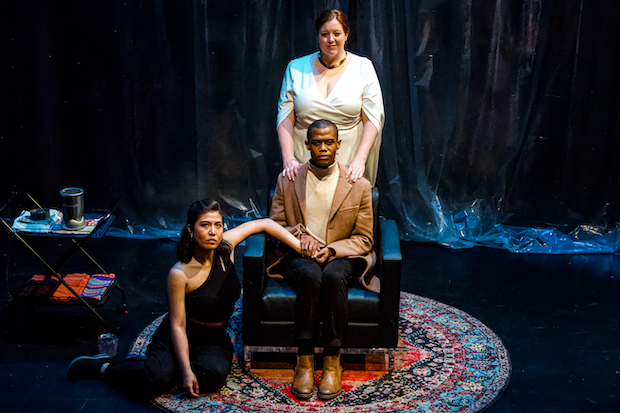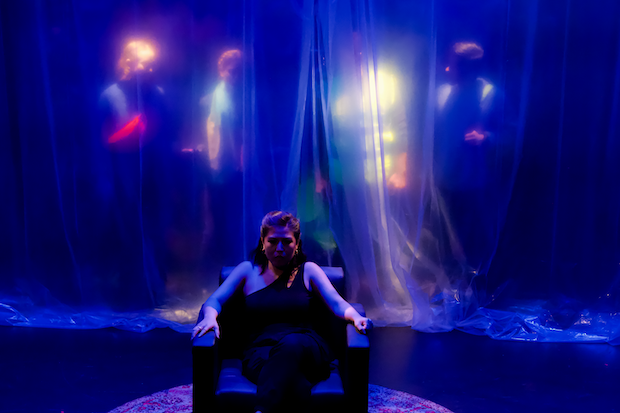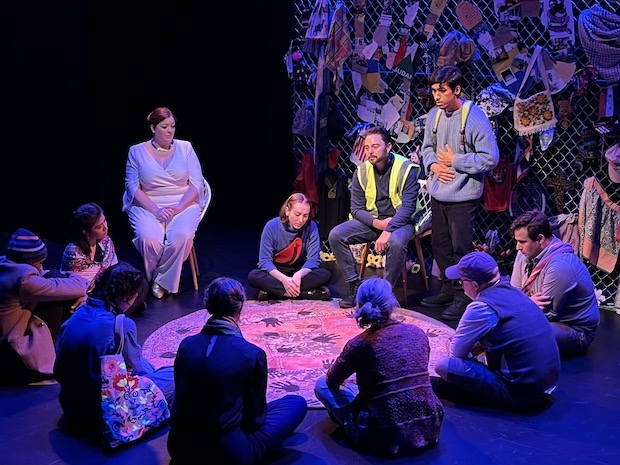Review: The Refugees Imagines One Mythic Family Confronting a Migrant Crisis

(© Kaylin Gess)
Clytemnestra looks fierce. Dressed in a regal white pantsuit, the sleeves joining in the back to form a chic capelet, she looks like she just came from the 2019 State of the Union Address, where she and fellow female lawmakers made a visible show of their #resistance to the most nativist president in modern history. But, when occupying the throne herself, would she be any more welcoming to the strangers at our southern border?
Playwright-director Stephen Kaliski examines that question in The Refugees, his clever appropriation of Greek myth, now making its New York City debut with Adjusted Realists (in association with Weber State University) at A.R.T./New York Theatres. Several recent theatrical projects, most notably the Broadway-bound revival of 1776, challenge audiences to envision how the world might be different if run by women. The Refugees is refreshingly honest in its assessment: It wouldn't be.
The central generational conflict is one straight off the dinner table of any number of upper-middle-class households, but with far higher stakes: While climate change has ravaged much of the world, Argos has benefited from "kind winds and plentiful rains." This has attracted refugees from Athens, Minoa, and Thrace. Queen Clytemnestra (Rachel McPhee) is disinclined to let them settle, but her woke children, Electra (Carolina Đỗ) and Orestes (Jonathan Nathaniel Dingle-El), try to convince her. Appealing to her grandmotherly aspirations, they lure her to the migrant camp, where she will listen to representatives from the three groups. Will she soften her heart and throw open the gates?
That seems unlikely. McPhee endows Clytemnestra with the unflappable authority of a supermom, someone who could lecture Sheryl Sandberg about having it all without blushing. She's more Catherine the Great than Angela Merkel — this is a woman who (allegedly) murdered her husband to take the throne — and she makes no apologies for unsentimentally wielding power in the defense of her family.

(© Kaylin Gess)
And boy, do those children need defending: Đỗ's Electra is a depressive, drowning her sorrows in green smoothies prepared by her nurse (Valerie Clayman Pye in a surprising and illuminating turn). As Orestes, Dingle-El seems like the type who is more excited about the Instagrammable moments at the charity gala than he is about actually raising money for refugees. Kaliski has placed him in a romantic relationship with Pylades (Matt Mastromatteo, who also serves as co-director). Pier Paolo Pasolini imagined something similar in Pylade, although the vibe of that play was more homoerotic fascist than what we find here: Cam and Mitchell from Modern Family. Even if she initially does it through the cowardly use of a messenger (the very funny Robert K. Benson), it's hard to blame Clytemnestra for overruling her naively idealistic kids.
But is she responsible for how they've turned out? As she does with the queen, Costume designer Kahei Shum ties these mythic characters to our own world by outfitting Orestes in a slim camel-colored coat, matching boots, and a stylish white turtleneck, providing a constant embrace of luxury. Set designer Anita Tripathi's palace furniture, while seemingly lifted from an accountant's waiting room, still offers a stark contrast with the deprivation of the refugee camp, quarantined by a plastic curtain. Clytemnestra's children are like this because they were raised into padded cells of privilege.

(© Kaylin Gess)
This version of the characters clashes with the violent events of their mythology, but Kaliski has repurposed them with partial success into a story about the lottery of birth. A chorus of refugees (Josue Guerrero, Lily Hilden, Suzanne Lenz, Jeremiah Maestas, and Grace Zito) tell stories that make it clear their dreams and aspirations aren't so different from ours (although the recitation of lyrics by Journey and Bon Jovi proves to be a ridiculous flourish that distracts from the moment).
In the mundane brutality of The Refugees, Kaliski lays bare the tangle of history, diplomacy, and politics that separates the Cuban defector from the Honduran border-crosser. Most refugees will have had little to no control over the circumstances that placed them into one category or another. In that way, the fatalist Greeks have something to teach Americans as we nervously stride into the 21st century clinging to our notion of free will and hoping to bend the arc of history toward justice.











